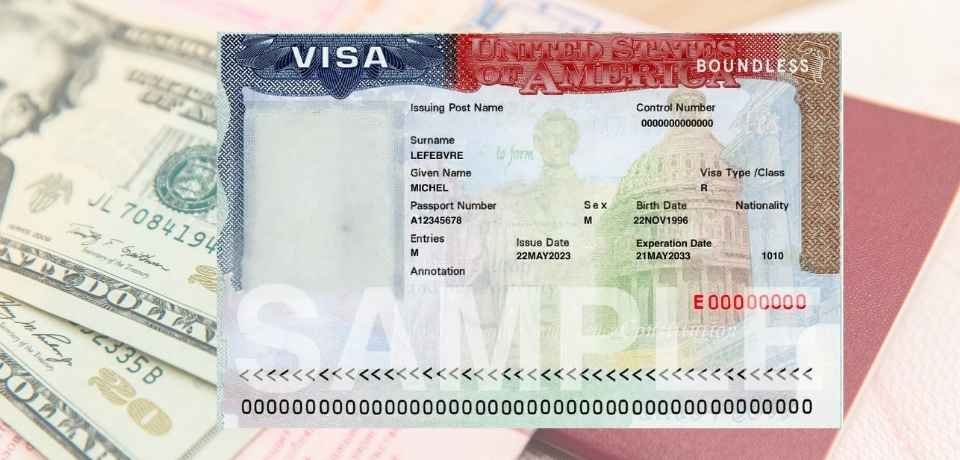There are many types of visas available depending on your travel purpose. Each visa serves a specific need, such as work, study, or attending professional events. This might make you ask, Is a conference visa as the same as tourist visa?
No, a conference visa is not the same as a tourist visa. A tourist visa allows you to visit a country for leisure or sightseeing. In contrast, a conference visa is meant for attending professional events like conferences or seminars. The requirements and allowed activities are different for each visa type.
Would you like to know more about the differences between these visas? In this article, you’ll find all the necessary information to help you choose the right visa for your next conference. Keep reading to explore more.
The purpose of a visa is to provide permission to enter and remain in a country for a specific period of time. Visas are essential for international travel. For most professional events like conferences, having the correct visa is crucial to ensure smooth entry and participation. Without the right visa, you could face complications or even be denied entry.

When you apply for a visa, it is important to understand the requirements for your specific purpose of travel. For example, attending a conference often requires a different visa than if you were simply traveling for leisure or tourism. Knowing this distinction helps avoid potential issues during your trip.
Many people are unaware that using a tourist visa to attend a conference can lead to problems. Tourist visas are meant for vacation and sightseeing, not for professional events. In this case, it’s better to familiarize yourself with the regulations and choose the appropriate visa based on your travel purpose.
If you’re attending a conference in the United States, understanding the USA conference visa is key to ensuring that your trip goes as planned. This specialized visa allows professionals to participate in business-related events without facing the restrictions that come with tourist visas. Make sure you meet all the necessary requirements for the conference visa before planning your trip.
Different types of visas are available to meet different travel needs and purposes. Choosing the right visa type depends on your reason for travel and destination. Below, you will find more details on common visa categories for various situations.
A tourist visa is designed for travelers who are on vacation or visiting sightseeing sites. It grants access to explore a country temporarily, without allowing any form of employment. The duration of a tourist visa may vary depending on the country, but it is usually for short-term stays. If you’re planning a vacation or visiting friends, this type of visa may suit you.
Workers who are offered jobs in another country are issued a work visa. It permits you to reside and work abroad for a specified period, usually linked to the employment contract. Countries may require proof of skills, job offers, or specific qualifications to grant a work visa. This visa is crucial for those seeking long-term employment opportunities in a foreign nation.
For those planning to study abroad, a student visa is essential. It allows the holder to stay for the duration of their educational program, which may range from a few months to several years. Certain countries may allow limited work hours with a student visa, but its primary purpose is for education. The applicant must be enrolled in an accredited institution to be eligible.
Traveling on a business visa allows individuals to conduct professional activities such as attending meetings, conferences, or business negotiations. This visa is usually short-term and does not allow permanent employment. Business visas cater to those who need to carry out temporary business dealings or establish new professional connections internationally without relocating.
Those traveling between one country and another require a transit visa. It permits you to stay for a limited time while in transit, typically less than a week. Transit visas are necessary when you need to stop over in a country but are not staying for an extended period. This type of visa ensures smooth passage without entry complications.
Each visa serves a specific travel purpose, and understanding the options can make the application process smoother. Always ensure you meet the criteria and prepare accordingly to make your journey hassle-free.
It might seem that conference visas and tourist visas are similar in terms of their purpose and requirements. Understanding the differences between these two visa types is essential to ensuring a successful visa application process and making the most of your trip abroad.

Tourist visas allow travelers to explore a country for leisure and sightseeing. In contrast, conference visas are designed specifically for those attending professional events such as conferences, seminars, and workshops. The key difference lies in the purpose of the visit, with one focusing on leisure and the other on professional development and networking.
The application process for both visas includes similar steps like filling out forms, submitting documents, and attending interviews. However, for conference visas, the process often requires more specific documentation. Typically, a conference visa needs an official invitation, registration confirmation, and proof of the event you’re attending to verify the professional purpose of the trip.
A tourist visa typically requires basic documents like proof of travel, accommodation, and financial stability. On the other hand, a conference visa needs additional paperwork, such as an official invitation from the conference organizer or proof of your registration. These documents verify your reason for traveling, making the process for a conference visa more detailed.
The length of stay permitted under each visa type varies. A tourist visa often allows more flexibility, granting travelers ample time to explore. A conference visa, however, generally limits the stay to the duration of the event plus a few days before or after, making it more focused on the specific event.
Tourist and conference visas fall under different visa categories. A tourist visa is usually categorized as leisure travel, while a conference visa is classified as a business or professional visa. This difference in category reflects the purpose of the visit and can impact the documentation, processing time, and immigration review.
The traveler’s intentions play a crucial role in visa approval. Tourists aim to relax and enjoy new experiences, whereas conference attendees focus on professional development and networking. For example, when visiting the USA, clearly explaining your professional objectives can enhance the ease of getting a USA conference visa by demonstrating a legitimate reason for entry.
It can take a significant amount of time for a visa to be processed. Tourist visas might take longer to process due to the high volume of applicants and flexible travel dates. Conference visas, tied to a specific event, often receive priority processing. However, timely submission of all necessary documents is crucial for a faster approval process, especially when the conference date is approaching.
The differences between a conference visa and a tourist visa are important to consider when planning your trip. By ensuring your application aligns with the purpose of your visit, you can experience a smoother visa process and focus on either exploring your destination or attending your professional event.
When deciding between a conference and a tourist visa, it’s important to understand the purpose of each type. Both options have specific guidelines that must be followed. Below are some common mistakes people make during the process.
Choosing the appropriate visa type ensures a smooth travel experience. Avoid these mistakes to prevent unnecessary issues during your visa application process. Always check the details before making a final decision.
The right visa is crucial to ensuring a smooth conference travel experience. It is essential to match the visa type with your purpose of attending the event. Here, you’ll find key tips for making an informed choice.

The first step in selecting the right visa is to clearly define your travel purpose. If you are attending a conference, you will need a visa that aligns with professional activities. Being clear about your objective helps streamline the application process and ensures you’re applying for the appropriate category.
Each country has specific visa requirements that vary depending on the type of visa you need. Always check the necessary documentation and prerequisites for the destination you plan to visit. This ensures that you are prepared with all the necessary paperwork and avoid last-minute issues.
You may need a different visa depending on the length of your stay. Some visas are for short-term visits, while others may permit longer stays. When attending a conference, make sure your visa covers the duration of the event and any additional time you plan to stay in the country.
There can be differences in visa processing times between countries and visa types. Plan ahead and apply for your visa well before the conference date to avoid delays. Some visas may take weeks to process, so it’s important to account for this when making your travel arrangements.
Some visas may come with conditions, such as restrictions on work or required proof of funds. Before applying, ensure that you meet all the conditions that come with your visa category. This will help you avoid unnecessary complications during your conference trip.
Making the right visa choice can simplify your travel to a conference. By understanding the various factors involved, you can ensure that your visa aligns with your travel needs. Always plan ahead for a smooth experience.
Understanding the differences between a conference visa and a tourist visa is essential when planning international travel. Below, you’ll find answers to common questions that help clarify which visa suits your needs when attending events abroad.
To apply for a conference visa, you generally need an official invitation letter from the event organizer, proof of registration, and possibly a letter from your employer. You might also need to provide a travel itinerary, accommodation details, and evidence of financial capability to support your stay.
A conference visa does not allow employment during your stay. It is strictly for attending professional events like seminars and conferences. If your intention is to work in the country, you must apply for a work visa, as conference visas only permit participation in specific business events.
Conference visas are typically issued for the duration of the event and may include a few days before and after the conference. However, the exact length of the visa will depend on the host country’s regulations, so it’s essential to confirm this when planning your stay.
A tourist visa is not meant for professional activities such as attending conferences or seminars. It is primarily for leisure travel, such as sightseeing or visiting family. Using a tourist visa for professional purposes could lead to complications, including visa rejection or immigration issues.
In most cases, a conference visa cannot be extended and is only valid for the period of the event. If you wish to stay longer, you’ll need to apply for another visa type, like a tourist or work visa, depending on your post-conference plans.
Traveling smoothly requires understanding the differences between a conference visa and a tourist visa. A conference visa is specifically for professional events like seminars and meetings, while a tourist visa is meant for leisure. So, “Is a conference visa as the same as tourist visa?” The answer is no.
When planning your trip, always ensure you apply for the correct visa type. Prepare all the necessary documents and check the visa requirements in advance. Best wishes for a successful application and an enjoyable travel experience!
300 Lenora Street #1497, Seattle, WA 98121, United States
1 236-477-8411 (Customer Service)
1 672-971-2088 (Hotline & WhatsApp)
+1 672-971-4036 (French Customer Service)
Mon to Fri (10 am – 6 pm PST)
International Conference hosts the most engaging conferences in USA to talk about business, economics, leadership, science, technology, engineering, nursing, and many more. Join the upcoming international conferences in USA to meet with industry professionals and enrich your knowledge.
Quick LInks
Copyright © International Conference. All Rights Reserved.